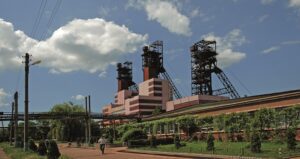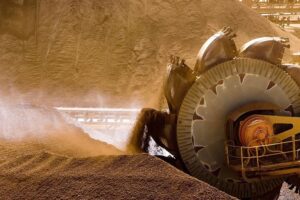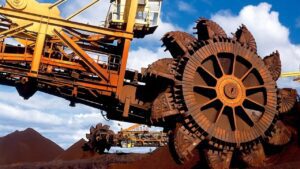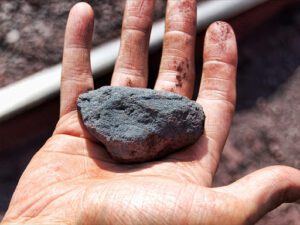
Zaporizhia Iron Ore Plant (Dniprorudne, Zaporizhia region) in 2021 increased iron ore production by 1.2% compared to 2020, to 4.620 million tonnes.
As the company told Interfax-Ukraine, during this period, 4.523 million tonnes of products were shipped to consumers.
At the same time, 263,900 tonnes of ore were mined in December, and 320,900 tonnes of products were shipped to consumers.
Zaporizhia Iron Ore Plant sells its products to metallurgical enterprises in Slovakia, the Czech Republic, Austria and Poland, as well as to Zaporizhstal metallurgical plant in Ukraine.
The main shareholders of the plant are Slovak company Minerfin, a.s. with 51.1697%, Zaporizhstal with 29.5193%, and Czech KSK Consulting, a.s. with 19.0632%.

Pivdenny Mining and Processing Plant (Dnipropetrovsk region) in 2021 increased output of iron ore concentrate by 6.1% compared to the previous year, to 13.582 million tonnes.
According to the company’s official information, in December 2021 the plant produced 1.318 million tonnes of iron ore concentrate, which is 23.9% more than in the same period of 2020.
Earlier, CEO of Pivdenny Mining Kostiantyn Fedin said in his New Year’s greetings that the plant had reached such a production indicator for the first time in the last 30 years.
Pivdenny Mining and Processing Plant is one of the main producers of iron ore raw materials in Ukraine – concentrate. It is engaged in mining and processing of ferruginous quartzites to obtain iron ore concentrate.

Mining enterprises of Ukraine in 2021, according to operational data, increased the export of iron ore in monetary terms by 62.91% compared to the previous year, to $6.91 billion.
According to preliminary summarized statistics released by the State Customs Service on Tuesday, iron ore exports in December amounted to $276.18 million, while in November it was $312.75 million, October it was $371.09 million, September $472.96 million, August $777.958 million, and July $782.04 million.
As reported, in 2020 Ukraine increased iron ore exports by 16% compared to the previous year, to 46.293 million tonnes, while foreign exchange earnings from iron ore exports grew by 24.7%, to $4.239 billion.
In 2020, iron ore was imported to Ukraine for $75,000 in a total volume of 123 tonnes, while in 2019 it was 14,245 tonnes for $1.412 million.

Ukrainian mining enterprises in January-November this year reduced export of iron ore raw materials (iron ore) in quantity terms by 2.8% compared to the same period last year, to 40.667 million tonnes.
According to the updated statistics released by the State Customs Service, during the specified period, foreign exchange earnings from iron ore exports increased by 78.7%, to $6.63 billion.
Iron ore was exported mainly to China (42.6% of supplies in monetary terms), the Czech Republic (9.61%) and Poland (7.82%).
In January-November 2021, iron ore was imported to Ukraine for $183,000 in a total volume of 1,202 tonnes, while in January-November 2020, some 104 tonnes of iron ore were imported for $58,000.
In January-November 2021, iron ore was imported mainly from Egypt (56.28%), the Netherlands (21.31%) and Poland (7.1%).

Mining enterprises of Ukraine in January-September of this year, according to recent data, increased exports of iron ore raw materials (iron ore) in monetary terms by 2.04 times compared to the same period last year, to $5.95 billion.
According to preliminary generalized statistics released by the State Customs Service, in monetary terms, iron ore exports in September amounted to $472.96 million, while in September 2020 – $387.3 million.
As reported, in 2020 Ukraine increased iron ore exports by 16% compared to the previous year, to 46.293 million tonnes, while foreign exchange earnings from iron ore exports increased by 24.7%, to $4.239 billion.

Zaporizhia Iron Ore Plant (Dniprorudne, Zaporizhia region) in January-July this year increased iron ore production by 7.5% compared to the same period last year, to 2.84 million tonnes (in January-July 2020 – some 2.642 million tonnes).
The company told Interfax-Ukraine that during this period, 2.705 million tonnes of products were shipped to consumers. At the same time, 423,000 tonnes of ore were mined in July, and 385,900 tonnes were shipped to consumers.
Zaporizhia Iron Ore Plant sells its products to metallurgical enterprises in Slovakia, the Czech Republic, Austria and Poland, as well as to Zaporizhstal metallurgical plant in Ukraine.
The main shareholders of the plant are Slovak company Minerfin, a.s. with 51.1697%, Zaporizhstal with 29.5193%, and Czech KSK Consulting, a.s. with 19.0632%.